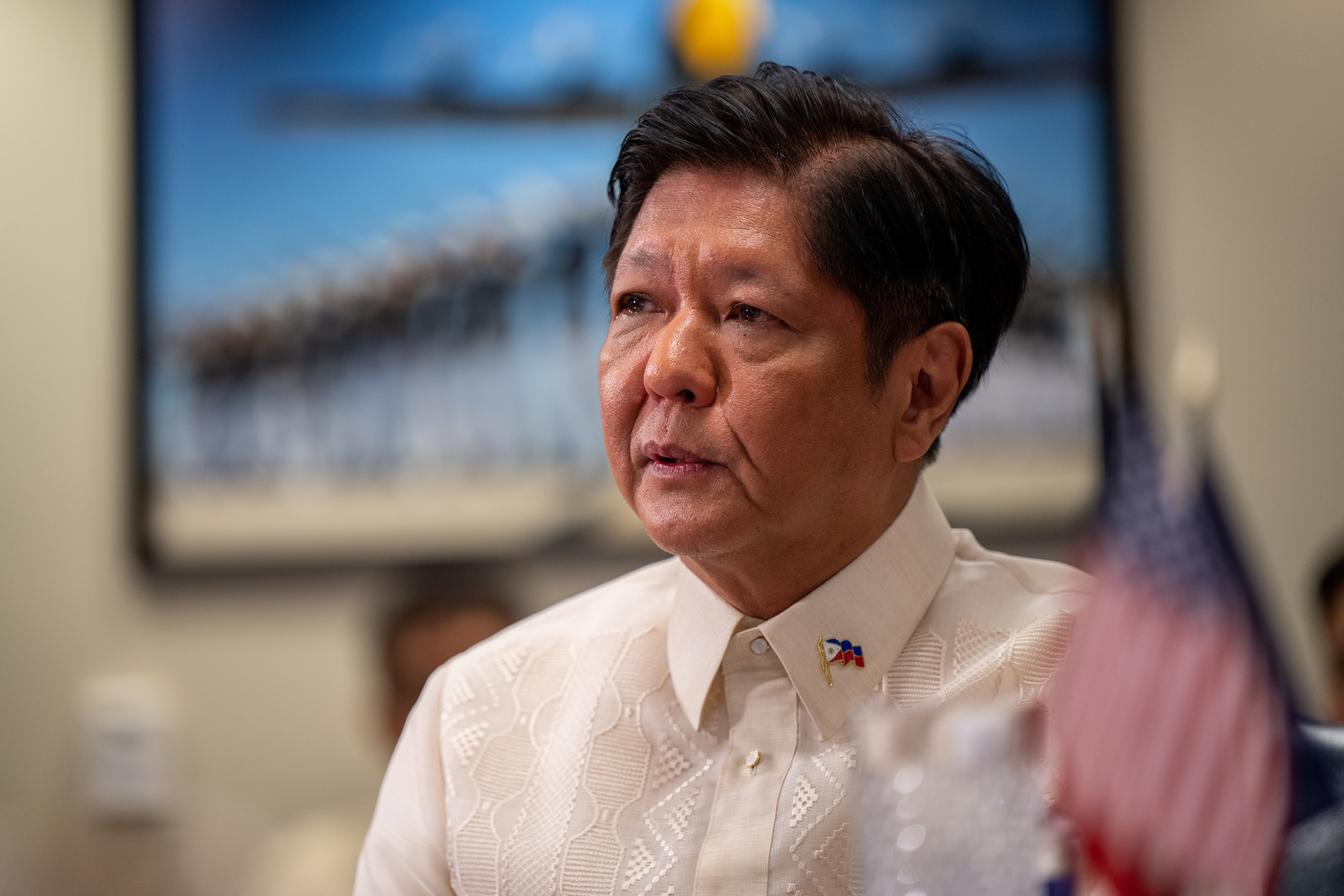
Allowing the United States to access four more basing sites is not a direct military challenge to China, Philippines President Ferdinand Marcos said Thursday.
The decision to provide the U.S. with military bases closer to the self-governing island of Taiwan was not a driving force in Manila’s decision, Marcos said.
During the negotiations over the new sites, the Biden administration never brought up the idea of using them as “staging areas” for offensive operations in support of Taiwan, Marcos said. Those operations would be “out of the parameters” of previous agreements between the allies.
“The United States has never said this is a possibility” nor asked for the Philippines to contribute forces to any operation to support Taiwan, Marcos said at the Center for Strategic and International Studies event. “I think we are in lockstep with the U.S. on that.”
Amid tensions between Washington and Beijing over Taiwan’s future, President Joe Biden has said repeatedly that if China attacks Taiwan, the United States will come to Taiwan’s aid.
“We have made it very clear [to the Chinese Foreign Minister Qin Gang], the bases we have opened up under the original [the 2014 Extended Defense Cooperation Agreement] with the United States is really because of the effects of climate change,” Marcos said.
China condemned the new sites, saying they threaten the peace and stability of the Indo-Pacific and are aimed directly at Beijing.
China, when combined with Hong Kong, remains the Philippines‘ largest trading partner. Manila has walked a fine line with Beijing on economic and trade issues while relying on its 71-year-old treaty with Washington for its security.
“Disengagement with China is not an option,” Marcos said.
But several times during the question-and-answer session he described the world the Philippines faces as “a complicated geopolitical situation,” with Beijing in rancorous territorial disputers and with the war in Ukraine raising questions over smaller nations’ sovereignty.
Marcos cited the extensive devastation that typhoons Yolanda in 2014 and Odette in 2021 wreaked on the Philippines and how the United States military responded by delivering humanitarian aid and disaster relief.
The four basing sites were chosen “to provide quicker relief” to a nation that “has been assessed as one of the most, if not the most, affected by climate change,” he said.
There has been no official announcement as to what kind of weapons the United States would bring to the sites.
As relations between China and the United States remain at an impasse, American and Philippine armed forces recently completed their larges-ever joint military exercise, Balikatan.
More than 17,600 soldiers, sailors, airmen and Marines participated in the drills. Philippines officials said it demonstrated Manila’s concerns over internal security, the desire to modernize its forces and become more interoperable with the United Sates when responding to a crisis or emergency.
Marcos, whose visit to Washington began earlier this week, came to the U.S. in the wake of a recent incident off the Spratly Islands in disputed waters, where two patrolling Philippine Coast Guard vessels narrowly avoided a collision with a Chinese warship.
In an interview this week with Reuters, Marcos said the Philippines will likely begin joint freedom of navigation operations patrols with the United States, Japan and Australia in contested areas of the South China Sea. He also told Reuters that Manila’s interest in a trilateral security arrangement with Japan and the United States as a future possibility but giving no further details.
At the same time, Manila and Beijing are engaged in a hotly contested dispute over who controls the Malampaya natural gas fields near Palawan. At the CSIS event, Marcos said the fields are important to the Philippines to generate power for projected industrial growth, as a producer of specialized batteries for electric vehicles.
He cited China’s use of the so-called “nine-dash line” to control a large swath of the South China Sea, versus the Philippines’ “baseline” for its exclusive economic zone “recognized by UNCLOS [United Nations Convention on Law of the Sea]” as central to the disputes that also include mineral extraction and fishing.
“There is no silver bullet” to end the dispute other than to continue negotiations, he said.
Marcos added that he has been pushing the Chinese to establish a “hotline” between the two nations “to keep levels of misunderstanding to a manageable level.” The original talks between Marcos and Chinese President Xi Jinping in January about the hotline concerned the friction between the two nations over fishing rights, illegal catches and oil exploration. But so far, there has been no movement on Beijing’s part.
On Ukraine, the Philippines was shocked, like most of the world, when Russia invaded in 2022, Marcos said.
“We must present a united front” in defending a nation’s right to sovereignty and to protect its borders from attack in the United Nations General Assembly, he said, adding that the Philippines and the Association of South East Asian Nations have condemned the attack and have felt the impact of the war, particularly with food supply.
“We must hold close” with Kyiv, he said.
Marcos’s visit was the the first time a Philippine president has come to Washington in a decade. Biden declared the alliance between the nations as “ironclad” during his welcome remarks.
Speaking at the White House event, Marcos said: “[I]t is only natural that – for the Philippines to look to its sole treaty partner in the world to strengthen and to redefine the relationship that we have and the roles that we play in the face of those rising tensions that we see now around the South China Sea and Asia-Pacific and Indo-Pacific regions.”





